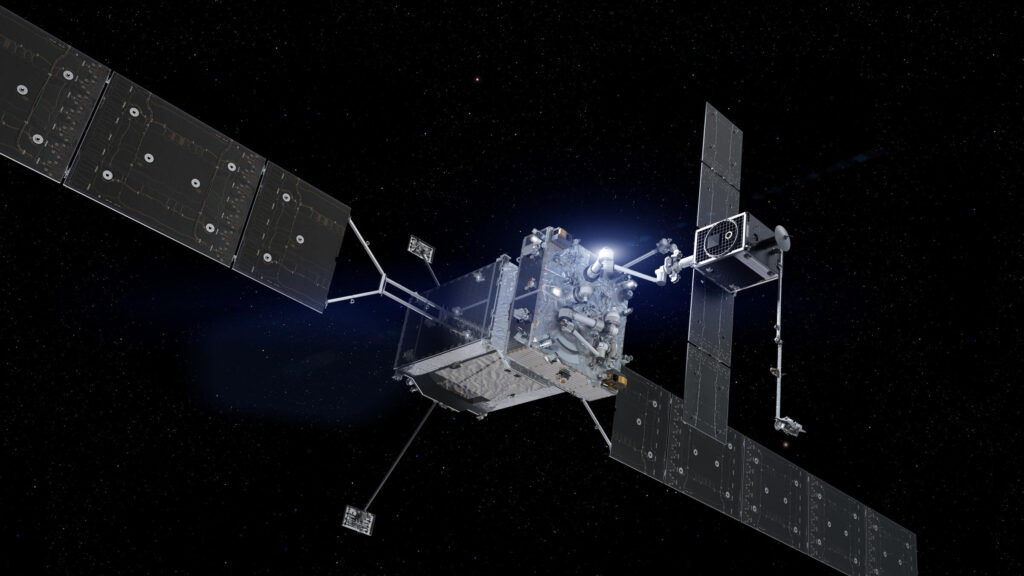
SpaceLogistic’s Mission Robotic Vehicle (left) will grab a client satellite and attach the company’s Mission Extension Pod (right) to provide propulsion to prolong the satellite’s on-orbit life. (Northrop Grumman SpaceLogistics)
WASHINGTON — After nearly a year interagency wrangling, the White House National Space Council today is releasing a legislative proposal that would split regulatory authority for new types of commercial space activities — such as on-orbit refueling and cargo delivery by rocket that have drawn interest from the Pentagon — between the Commerce and Transportation Departments, according to White House officials.
“U.S. industry leads the world in bringing the benefits of space to Earth. This legislation ensures that our government will build a regulatory environment that supports commercial expansion to benefit all Americans,” said Deputy Secretary of Commerce Don Graves in a press statement.
The decision about what is often called “mission authorization and supervision” has been eagerly awaited by US companies seeking licenses for activities that fall between the cracks of the US commercial space regulatory regime, which has meant interminable wait times, agency hopping and plenty of red tape. As many of the companies pursuing such “new space” activities are start-ups, the regulatory uncertainty has been a constant gnawing on their ability to secure investments.
Currently, the Commerce Department (DoC), via the National Oceanic and Atmospheric Administration, regulates commercial remote sensing systems; the Transportation Department (DoT), via the Federal Aviation Administration, regulates commercial launches and reentries; and the semi-independent Federal Communications Commission (FCC) regulates use of the electromagnetic spectrum, including by satellites.
The draft bill covers a plethora of space activities that do not fit into, or straddle, these licensing regimes, including commercial space stations being pushed by NASA, in-space assembly and manufacturing, space debris removal, and “gas stations” in orbit, according to a White House official who spoke to reporters on the condition of anonymity.
Though the bill deals with “commercial” activity, US Space Command in recent months has prioritized requirements for what it calls “dynamic space operations” — the ability for spacecraft to (relatively) rapidly, and cost-effectively, move on orbit — and the development of technologies to support that capability. This includes on-orbit refueling and repairs to extend the working life of satellites, advanced propulsion systems and on-board artificial intelligence systems to allow more precise maneuvers as well as high-speed data processing.
The move by the National Space Council to release the draft legislation was in part triggered by the release of another bill by Rep. Frank Lucas, R.-Okla., who chairs the House Committee on Science, Space and Technology, and Rep. Brian Babin, R.-Texas, who chairs that committee’s subcommittee on space and aeronautics, several US government sources told Breaking Defense.
That bill would tap Commerce as the sole regulatory authority for all private sector space activities. It also would in effect repeal the current licensing processes in favor of a streamlined certification process with in essence a presumption of approval. The bill is being marked up today.
According to the White House official, the National Space Council draft bill includes the following provisions:
- DoT’s current authority over the safety of humans for launch and reentry would be extended “to the safety of humans when in orbit, on a commercial space station, on/around the Moon, or another celestial body.”
- DoT’s current licensing authority for space launch and reentry would be extended to “in-space transportation for delivering goods from one point in space to another or to/from the lunar surface. An example includes delivering fuel from a space fuel depot to a space station.”
- DoC’s licensing of remote sensing satellites would be expanded “to include all novel space activities that are not human-rated or assigned to DoT. Examples include in-space assembly and manufacturing missions, and satellites responsible for removing space debris.”
- Both agencies “would stand up regulatory review processes that leverage expertise and perspectives from other departments and agencies (e.g., DoT leveraging NASA’s human spaceflight expertise to set safety regulations for commercial space stations and space tourism).”
- Both agencies “will consider space safety and sustainability as part of their licensing process to include plans to avoid creating space junk.”
Lastly, the White House official said, the draft bill would codify DoC’s authority to provide “space traffic coordination and warnings to avoid collisions in space” for non-military operators in the US and abroad — taking over that responsibility from the Department of Defense. DoC and the Pentagon have been working on processes for transferring that mission for several years, with the Space Force and SPACECOM hashing out how to transfer data collected by military space monitoring sensors, much of it classified, to DoC without compromising security.
National Space Council staff are briefing staffers on Capitol Hill this morning, followed by briefings for stakeholders, according to a lobbyist who closely follows the issue. But given all the other pressing issues facing a sharply divided Congress as the end of the year bears down, the fate of the draft bill is up in the air.








